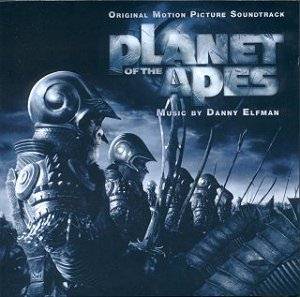Danny ELFMAN Planet
of the Apes (2001) orchestrated by Steve Bartek, Mark
McKenize, Edgardo Simone, David Slonaker, conducted by Pete Anthony,
produced by Danny Elfman  Sony Classical SK 89666 * [58:29]
Sony Classical SK 89666 * [58:29]

Tim Burton and Danny Elfman return for their
ninth feature film collaboration and one of the most eagerly awaited
films of the year. Of course Planet of the Apes has an
illustrious ancestor in the 1968 film of the same name, though
where that movie posited evolution the remake illustrates Hollywood's
devolution. With Planet of the Apes and 2001: A Space
Odyssey released in the same year, cinematic science fiction
finally came of age. In the year 2001 Hollywood movies have regressed
to second childhood. The original Planet of the Apes was
landmark cinema, not least in Jerry Goldsmith's groundbreaking
score. Burton's Planet of the Apes is this week's $100
million science fiction spectacle, though compared to the competition
it could be Shakespeare. Given the impossibility of living up
to the original's impact, Burton's film is decent entertainment,
and Burton is both enough of an Apes fan and a sufficiently
accomplished director to deliver a work which keeps the faith.
One way in which he does this is through Danny Elfman's score,
which effectively updates and elaborates upon Goldsmith's percussive
original.
Compared to the music on this album most action
movie scores only play at excitement. Of course Elfman's background
in rock and the percussion-heavy Mission: Impossible (1996)
have stood him in good stead. Be warned; this album is loud, furious
and relentless. It contains possibly more percussion, played more
intensely than any other film music album I have ever heard. Strictly
not for the faint-hearted, this is a serious hardcore sonic assault
which sets out to thrill by the sheer power of massed percussion.
It takes no prisoners, offers no relief, and is something of a
challenge to listen to all the way through at once at a realistic
volume. Anyone in search of the proverbial good tune is on the
wrong planet.
Given the nature of the music, Elfman does add
heavy brass, strings and some jittering electronics, the album
is necessarily somewhat repetitive. However, the composer spins
a wide range of variations, both in rhythm and in percussion instruments
used, real and sampled. There is an enormous range of instrumentation
on the album, most of which I could not begin to identify. Hard,
fast and exciting throughout, Elfman really pulls out all the
stops for the key set-piece "The Hunt." He is after all completing
with one of Goldsmith's most celebrated cues. Elfman's "The Hunt"
is a stunning kaleidoscope of sound and a furiously thrilling,
endorphin pumping rush of music which must stand out as the finest
action cue of the year. The sound throughout is absolutely phenomenal,
through there is a little tape hiss in one or two cues.
There are a couple of oddities. Track 14 is another
version of the "Main Titles", called simply "Main Title Deconstruction".
It is a partly striped-down version of the main title cue, with
more emphasis on a resonant sequenced riff panned hard left and
right. The album ends with something called "Rule The Planet Remix",
which is strange because there isn't a track called "Rule The
Planet". It is a pop version of the main theme and created by
Paul Oakenfold, who is as much of a star in pop mixing circles
as Danny Elfman is in filmdom.
Of course "Rule The Planet Remix" has nothing
to do with Elfman's score, and everything to do with the charts.
Danny Eflman's score for Planet of the Apes reveals in
the possibilities of rhythm. Conversely, with all the limitless
possibilities of sampling and digital music creation, "dance music"
has reduced the infinite possibilities of the world's rhythms
down to a monolithic binary pulse. Mr Oakenfold reduces Elfman's
music to a backing track "dance music's" monolithic binary pulse.
Oakenfold then, in the way common to "dance music", mixes in lines
of dialogue which are meaningless and arbitrary out of context.
It is not just that this is typical "dance music" noise which
so irritates, as that it utterly betrays the sensibility of Elfman's
music. It will probably rule the planet pop.
So, excepting the appalling work of Paul Oakenfold,
this is a very strong album. A shame about the CD insert which
is one of those foldouts which once opened will never properly
fold flat again, and a double shame that so much of it is filled
with adverts for further Planet of the Apes merchandise.
Gary S. Dalkin

